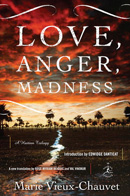

Modern Library, paperback, 9780812976922
I have read several books by Haitian writers. None of them could be described as happy. Marie Vieux-Chauvet's 1967 trio of novellas (individually titled Love, Anger and Madness) is possibly the least happy of all of them. It may also be the best.
The three novellas tell deeply personal tales of ordinary Haitians. In Love, three sisters love the same man, the dashing Jean Luze, a French businessman visiting the island. He marries Félicia, has an affair with Annette, and flirts with the aging, virginal Claire, the story's narrator. The sisters' deteriorating relationship is stiflingly claustrophobic. The family, like Haiti, is inescapable for the poor mulatto women. The town in which they live is presided over by Calédu, a murderous and tyrannical military commandant. Only the European Jean Luze is free to leave. The women try to find their own means of escape in marriage, family, and, finally, violence.
In Anger a family watches as their land is forcibly occupied by the local militia. They, too, can see no escape. Each tries to engage with their oppressors. Paul, a young man, thinks about joining the black-shirted militia even as it fills him with disgust, to earn the fear and respect to save his family. His sister, Rose, offers herself to be repeatedly raped by the local commandant for the return of the land. Their father gains leverage by aiding the commandant in his financial dealings. Although they are trying to gain freedom, they are simultaneously drawing themselves deeper into the world that is ruining their lives. Their salvation lies in their humiliation.
Madness is darker still, a stunning hallucinatory piece about René, a poet who locks himself in his house for eight days, and sees devils spread through the town , murdering and raping. René's detachment from reality fails to mask the reality of a town ruled by fear and filled with the possibility of death.
The three novellas are very different observations of Haitian life, disparate in terms of setting, characters and chronology. However, Love, Anger, Madness fully deserves its subtitle: "a Haitian triptych". Taken as a composite, the three stories form a picture of a country stifled by fear and beset by racial and social conflicts from which escape is impossible. Sexual violence is commonplace, and blacks and mulattos are manipulated into fighting and oppressing their countrymen, while rich Europeans are free to come and go, and exploit, as they please. Vieux-Chauvet's writing is tense and claustrophobic, mirroring her narratives. The style reminded me of Jean Rhys' Wide Sargasso Sea, doom-laden and tense. The translators, who were previously responsible for superb translations of Patrick Chamoiseau's novels, have done a fantastic job rendering this atmosphere into English.
The book is brutal, visceral and harrowing, with few moments of beauty. However, that doesn't mean it isn't a beautiful
book. Love, Anger, Madness is, quite simply, stunning. It has taken 40 years for an English translation to arrive,
and it is an opportunity to re-discover a piece of classic literature that should not be wasted.
